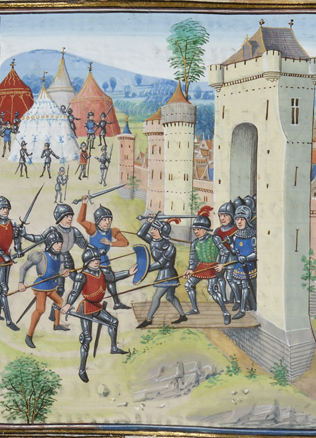What Did a Lithuanian Warrior Say Inside the Church of Kubesėlė in 1207?
Mažvydas, the drama by a famous Lithuanian poet and playwright Justinas Marcinkevičius (1930–2011) ends with an episode when Martynas Mažvydas, the author of the first book in Lithuanian, teaches people to read, syllable by syllable, the word Lietuva (Lithuania). For many Lithuanians, this byplay is familiar from theatre performances or lessons in literature. In many cases, the artistic suggestion has a power of turning author’s verisimilitude into a historical truth. It may seem that Lietuva is the first word pronounced by our ancestors. What is, however, the first real word documented in historical sources? To find out, we must travel further back to the times well before the middle of the 16th century when Martynas Mažvydas lived.
Bellicosity and oratory of the old Lithuanians
The whole story took place away from Lithuania, in the territory of modern Latvia. There, by the Gulf of Riga, Livs dwelled from times immemorial who, just like Prussians, gradually faded away from historical maps. Albert (ca. 1165–1229), the German missionary, disembarked in the Liv lands in 1200 in order to spread Christianity in the pagan territories. He founded the city of Riga in 1201 and, a year later, the military order called the Brothers of the Sword because they used a symbol of sword as their insignia.
It was Lithuanians who noticed the arrival and settling of the uninvited guests in the lands of the neighbouring peoples. Lithuanians have long been raiding the nearby territories earning a nimble nickname of wolves:
“And Russians would run through woods and villages after noticing Lithuanians, even very few of them, just like rabbits run after seeing hunters, and Livs and Latgalians would be a prey for Lithuanians just like sheep left without a shepherd in the jaws of wolves.”
In the winter of 1207, right before the Christmas, a considerable Lithuanian force arranged a big raid into the Liv lands. On the 24th of December, at night, they crossed the Daugava River to reach the surroundings of the present-day Latvian town of Turaida. Since the local people had not been informed about the Lithuanian raid in advance, many of them were killed yet even more were captured. A little west off Turaida, there is an old mound of Kubesėlė which at that time already featured a small castle with a Christian church. A part of Lithuanians turned to the church where, in the morning of the 25th of December 1207, two priests were celebrating the Holy Mass to honour the birth of Christ. After learning about the approaching Lithuanians, the parishioners hurried out of the church. Some of them chose to run to forests and escaped while the others were captured or killed by the Lithuanians on their way home. As the main forces surrounded the church, the Lithuanians first rushed into the priest’s house to seize horses, cattle, food and household goods as their war plunder the latter of which they placed on sledges. Meanwhile, the priests in the church continued the service relying heavenly protection only. Now, the historical source continues the story: “In God’s grace, after finishing the Holy Mass, they start taking covers and all vessels off the altar, then they place them in the corner of the vestry and hide themselves by seating in that same corner.
Immediately after that one of foes enters the church, walks it around down to the vestry and, looking at the empty altar and seeing nothing to sack, utters “Ba” (pronounced [ba:]), leaves to join the others.
After taking everything they found with them, the Lithuanians turn back.”
The historical “ba”: the result of the Lithuanian emotionality or a sound misheard by fear-stricken Germans?
The mysterious “Ba” – what can it possibly mean? There is such a word in the current Lithuanian language. As well as in some other languages, it serves as a universal expression of certain emotion or inner state, the so-called interjection or a specific emoticon if we use the present-day language. The emotions expressed by that word can vary from uncertainty to confidence, from sadness to joy, from anger to amazement, from revulsion to admiration.
It is difficult to determine now what did our ancestor exactly wish to say after seeing the home of the Christian god which was empty and meaningless to him. Perhaps that was wonder, anger or dismay, or maybe something else. The Livonian Chronicle by Henry of Latvia which features the quoted story was written about 20 years (from 1225 to 1227) after the recorded events had taken place.
It is not clear whether the German priests, who were scared and hid in the farthest corner and who hardly knew the language of the local people, could convey precisely the words of a Lithuanian inside their church.
The first word by an ordinary Lithuanian documented in historical sources points to strong emotional beginnings, elemental vitality and ties with tangible things and earthly rather than abstract and contemplative.
As 800 years have passed since that bawl in the wilderness of history, let’s ask ourselves if we can still utter “Ba!”?
Literature: Mindaugo knyga. Istorijos šaltiniai apie Lietuvos karalių, parengė ir į lietuvių kalbą vertė D. Antanavičius, D. Baronas, A. Dubonis, R. Petrauskas, Vilnius, 2005, p. 97.
Darius Antanavičius



